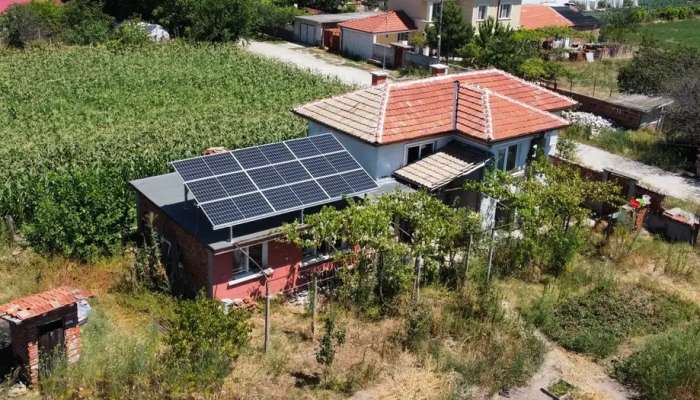
Sofia: Several years ago in Belozem, a wisp of a village in south-central Bulgaria, two unlikely young energy pioneers set out on a mission: Even though it was not yet feasible according to Bulgarian law, they wanted to launch a clean energy collective like the ones they'd heard about elsewhere in the European Union.
Several thousand of these grassroots community energy projects are dotted around the EU, mostly in northern Europe. In these DIY endeavours, not only do townspeople invest together in renewables, but they also democratise the clean energy transition by actively participating in it.
At first, Belozem's interest in renewable energy had nothing to do with climate protection or income generation but with basic material needs. The country has one of the highest levels of energy poverty in the EU, with a quarter of the population unable to adequately heat their homes.
In Belozem, as in much of rural Bulgaria, frequent power outages stop the village cold for hours a day, laying low even the power-driven well pumps, cutting off access to water.
"We wanted to find our own solutions to our problems as a community," Mihail Georgiev told DW. With his brother Tsvetan, who, like Mihail, is in his early 30s, he started looking for ways to make that happen.
Mihail became interested in environmental issues while studying in the United Kingdom. In 2018, he and Tsvetan, an engineer, started their own consultancy. Today, they live in Plovdiv, a large city close to Belozem, where they own property.
The brothers' background as entrepreneurs didn't help much with their endeavor because Bulgarian law didn't allow for energy communities at the time. Although Bulgaria, like every EU member state, must pass legislation that provides a legal basis for energy communities by 2024, civic energy cooperatives only became legal in October 2023.
In need of advice, the Georgievs reached out to a Europe-wide popular movement pushing for energy democracy. NGO experts in Bulgaria's capital, Sofia, and Brussels also urged them to forge ahead, regardless of the legal vacuum.
Critical to the project was REScoop.eu, a European federation of citizen energy cooperatives based in Brussels, which has worked with hundreds of start-up energy communities across the continent. "A lot of initiatives elsewhere have gone through this process, so they have the know-how to support newcomers," explains Stavroula Pappa of REScoop.eu.
The brothers first had to establish a company to register as an energy producer. This meant they could bolt solar panels onto their roof and sell electricity back to the grid authorities.
The ability to market their power separated them from the more than 9,200 producers of solar energy in Bulgaria who consume their own product.
Despite stellar conditions for solar and wind power, Bulgaria currently covers just under 19% of its power supply with renewables. In 2022, the country experienced a small solar boom, but most of its green energy hails from hydroelectric generation.
Kristiyan Dimitrov of Greenpeace Bulgaria says it's hard for his compatriots to get their heads around DIY energy production: "People here are used to a straightforward way of getting their electricity: They pay, and the utilities provide the energy."
The European Commission thinks the Georgievs's project — called Izgrei, which means "the rising sun" in Bulgarian — could be the beginning of something much bigger in Bulgaria. "Izgrei is one of the community-based energy initiatives driving change from the ground up," it says on its website.
The brothers started small: just nine panels and four co-owners. The initial investment was €7,500 ($8,200). The array supplies the two-story house where it was installed; the surplus is sold to the grid.
From the beginning, Izgrei set out to be an energy community that embodied the principles of its larger citizen-energy peers in northern Europe, some of which have thousands of members.
This means that membership is open to anyone in the locality willing to invest and that the members control the project democratically. The co-op must also have the community's interests — and not just the investors — at heart.
Belozem's local administration was enthusiastic about having the first clean-energy community in Bulgaria and is even more excited about its expansion and the possibility that revenue from the project will spruce up the village, for example, in the form of investments in road repair.
The changes to Bulgaria's Energy from Renewable Sources Act mean that energy cooperatives can now be set up there. The amendments have accelerated the process of getting a permit for green energy
But experts say that the law isn't close to being complete. "There are still no concrete procedures outlined in the law," explains Ventzeslava Kojouharova of Friends of the Earth Bulgaria, an NGO in Sofia. She adds that it doesn't specify how to set up an energy community, only that they may exist.
"Technical details and specifications are missing," agrees Dimitrov from Greenpeace, who points out that the EU directive states that the operation of energy communities must be both legal and possible.
Izgrei and Greenpeace are working with lawmakers to improve the law.
Izgrei is also producing a how-to guide for energy communities in Bulgaria and doing advocacy work. The EU's Citizen-Led Renovation Initiative assists it with business-model development and community outreach.
"What works in Belgium isn't necessarily applicable to Bulgaria," says Mihail Georgiev, who remains in touch with northern European counterparts. "But the new law is a ray of hope. Now Bulgarians know there's such a thing as an energy community."